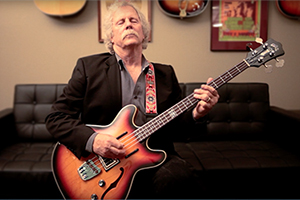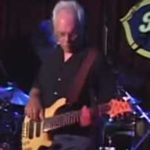Byrds co-founder talks about bidin’ his time — for more than 50 years
Exclusive interview with FBPO’s Gary Graff
January 29, 2018
If Chris Hillman had just been the bassist in the Byrds, his musical legacy would be insured. But the Los Angeles-born multi-instrumentalist has done much more than that. Hillman, now 73, also co-founded the Flying Burrito Brothers and The Desert Rose Band and these days tours primarily with Desert Rose bandmate Herb Pedersen. In September, meanwhile, he released Bidin’ My Time, his first solo album in 12 years — which took on greater notoriety since it was produced by Tom Petty and represents the late rocker’s last studio work. For Hillman, meanwhile, it was a chance to blast back to the past, reuniting with Byrds mate David Crosby on a new version of the Byrds’ “Bells Of Rhymney” and with Roger McGuinn for a rendition of the rarity “Here She Comes Again,” for which Hillman picked up his bass for the first time in more than 30 years. Petty’s death a month after the album came out took away some of the joy of the release, but if anything it only bolstered Hillman’s passion to carry on and keep playing…
FBPO: It’s been a minute. What took 12 years between albums?
Hillman: Y’know, I just didn’t have the inclination. I didn’t think I would ever make another record, and it wasn’t coming out of any kind of bitterness. It was: “OK, I’ve had a great 54-year career, and looking at the way the business is I don’t know what would be the point.”
FBPO: So what changed your mind?
Hillman: This really fell into my lap. I had some songs that I had not recorded, but I was sort of winding down. I’d go out and do some shows with Herb Pedersen; that’s a comfortable thing, doing duets with him. But this just came along through Herb and Tom Petty. I had a conversation with Tom in the fall [of 2016]; I said: “Are you sure you want to do this?” And he was: “Do you want me to do this?” “Of course! I’d love to work with you.” He said: “Great, we’ll use my studio and everything.” I told him the budget, which wasn’t very much, and he said: “That’ll be interesting…” [laughs]
FBPO: The Byrds, of course, were such a huge influence on Tom, of course. It’s appropriate he’d want to do something with you.
Hillman: Yeah, Tom has always acknowledged the Byrds in the early part of his career. He cut a couple of our songs, “Feel A Whole Lot Better” and “…Rock and Roll Star” on a live album, and he really nailed ’em. And he’s a great guy. I knew him from 1978, when the Heartbreakers were just starting to get moving, and I really got to know him on this project.
FBPO: So what was the recording like?
Hillman: All in all, it was a joy. I’ve never had as much fun recording, and I think a lot of it has to do with there really was no pressure attached. I wasn’t going after a new career or trying to get on the charts — whatever that means. It was just: “Let’s go in. I have songs,” and we went from there. But also, when I was talking to Tom I said: “You haven’t even heard some of the songs.” He said: “I’m not worried,” and I was: “Well, I’d be worried because I don’t know if they’re that good!” [laughs] But everything worked out great.
FBPO: No power struggles or collision of sensibilities, then?
Hillman: Nah, none. It’s hard for me to look at Tom as a true rock star. He’s such a humble guy and he loves music and he understands and loves all kinds of music, which I like. So as a producer, he was fantastic. I told him up front: “Listen, there might be a song you don’t like, and you tell me. We’ll work it out.” And there were one or two where he said: “I don’t hear that,” and I messed around with it again and I came back and said: “You’re absolutely right.” So we had a good working relationship, and it was just a joy. Everybody had a great time.
FBPO: Between your guests and some of the songs you cover, this album comes off like a bit of a culmination, a combination of your career to this point. Was that the intent?
Hillman: Not really. When I was getting towards the end of it is when I finally went: “Wait a minute, this is starting to sound like some sort of planned, conceptual record” because it was covering pretty much all the different bases where I started out as a young man playing bluegrass in California and going into the Byrds and all that. I wasn’t aware of that when I started, but all of it sudden here’s these elements of my five decades.
FBPO: And a lot of diversity, which must also be rewarding.
Hillman: What do we want to all do as musicians or songwriters or whatever? We want to initially imitate as we learn and then innovate and develop a signature style — at least stay true to that and whatever your comfort zone is. I don’t care for that term, but it’s true. The point being is to stay true to yourself, I guess. So when I hear this record, I’m not one to go: “Gee, that’s great!” I never come off of a record: “That’s the greatest thing I ever did!” There’s always things I wish I had done differently. That’s pretty normal for anybody, but you just have to sort of stay within those bounds, those parameters of what you do and develop over the years.
FBPO: You brought “Here She Comes Again” out of the Byrds vaults for the album — and played bass on it. What was that like.
Hillman: Oh, I had a ball. I don’t get a chance, really, to play the bass. And here’s this beautiful Guild Starfire bass, the Byrds anniversary reissue of this bass I had in 1965. I think I played it on “Eight Miles High” and the “Turn, Turn, Turn” sessions and somehow it got lost or stolen and I ended up with a Fender Precision bass throughout the rest of the Byrds. So I had just a wonderful time, especially playing with Steve [Ferrone]. What a great drummer! He’s just so solid and in the hip pocket. It was just great. Tom played guitar on that and Benmont [Tench] and Herb, and Roger played on it. I had a great time playing bass on that.
FBPO: Did it give you a hankering to do more?
Hillman: No, No. I missed it. I mean, I could teach you everything I know, but I love the instrument. But I just don’t see ever putting a band together and doing that.
FBPO: The variety of styles really stands out on the album.
Hillman: Well, it wasn’t a big stretch for any of us in the Byrds to…Well, it was to go from folk music and plugging in, but it wasn’t a big stretch when McGuinn and I did Sweetheart of the Rodeo to go into more of a country thing, ’cause it’s really where we were coming from. That was just expanding on the original, the foundation, the roots of where I came from.
FBPO: It’s musical alchemy in a way.
Hillman: Yeah, sure. Initially when I was in high school I went through the rock ‘n’ roll period from 1956 through ’59, like everybody my age, and then I got into folk music, but I went through the Kingston Trio right into the traditional mountain music, bluegrass, old-time music and stuff. That was really my base, and I went from there. And like I say, in the Byrds there was a quiet understanding between the five of us, initially, where we were coming from that folk base, and I remember our manager saying to us: “Go for substance.” He’s the one who brought us “Mr. Tambourine Man;” He got it from Albert Grossman, Bob Dylan’s manager, with Bob’s permission. He told us: “Make records with depth that you’ll be proud of in 40 years.” We didn’t always hit them out of the park. We made some silly records like everybody else, but that was wonderful advice.”
FBPO: You’re writing a memoir, too, right?
Hillman: Yeah, like every other aging musician. [laughs] Mine’s about music. It’s not about which guy died of drugs or this or that. It’s about having that passion for music starting in 1963 when I got paid for the first time, $15. Every year I thought: “Well, I’m going to go enroll in college,” and a door would open and I’d go through that door. It was an interesting journey, and hopefully people will find it interesting enough to read about.


